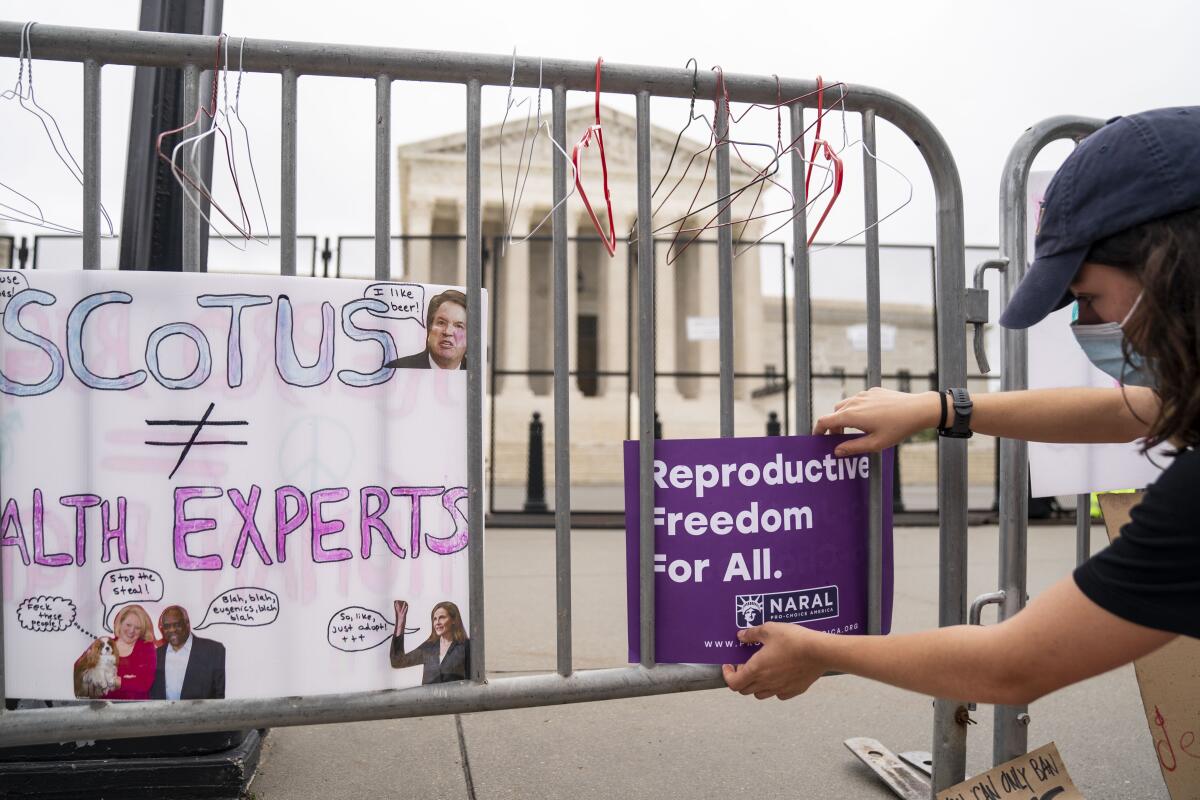Supreme Court decisions due soon on abortion, guns, religion and climate change

WASHINGTON — The Supreme Court is heading into the final weeks of a term that may reveal the full impact of its newly dominant conservative bloc.
The justices have 33 remaining cases to be decided by the end of June or the first week in July. The issues include abortion, guns, religion and climate change.
In years past, the end-of-term rush often featured a mix of conservative and liberal rulings. But since Justice Amy Coney Barrett replaced the late Ruth Bader Ginsburg, the wins for liberals have been few. During most of this term’s arguments, the main question was whether the conservatives would rule narrowly or broadly.
Here are the most significant questions to be decided:
Abortion and Roe: Should Roe vs. Wade be overruled and states be given the authority to outlaw most or all abortions?
Last year, the court agreed to hear Mississippi’s appeal of a law that would limit legal abortions to 15 weeks of a pregnancy. But the state’s attorneys said the court should go further and overturn the right to abortion established in 1973.
A draft opinion leaked in early May indicated five justices were prepared to do just that. If so, it would be one of the most significant reversals of a constitutional right in the court’s history. (Dobbs vs. Jackson Women’s Health Organization)
Guns and right to carry: Do lawful gun owners have a right to carry a loaded firearm with them when they leave home, or may states limit “concealed carry” permits to those who show they have a special need to be armed?
Most states allow gun owners to carry their weapons, but New York, California and six other “blue” states restrict these permits. Gun rights advocates sued to challenge New York’s law, and urged the court to rule the 2nd Amendment protects the right to “bear arms” in public. (New York State Rifle & Pistol Assn. vs. Bruen)
Religious schools: Do students enrolled in religious schools have an equal right to public funds if their state funds other private schools?
Maine has small towns with no high school, so it provides tuition aid for students to attend other schools — public or private — but not religious schools.
The court’s conservatives will likely rule that refusing to pay tuition for students in church schools in such cases amounts to unconstitutional discrimination against religion. If so, the ruling could open the door for those who want to include religious options among big-city charter schools, which are privately run but publicly funded. (Carson vs. Makin)
EPA and climate change: Can the Environmental Protection Agency require states to reduce the carbon pollution that is warming the globe by moving away from coal-fired power plants and shifting toward natural gas, wind turbines and solar energy?
The Obama administration proposed such an ambitious plan, but it was blocked by the high court in 2016 and set aside later by the Trump administration. Now, West Virginia and 18 other coal states want the court to rule that the EPA and the Biden administration lack broad regulatory authority to fight climate change. (West Virginia vs. EPA)
Praying football coach: Does a high school football coach have a free-speech right to kneel and pray on the 50-yard line, or may the school forbid teachers and other employees from conducting such prayers?
Since the 1960s, the court has told public schools they may not promote group prayers based on the principle of church-state separation.
But the court’s conservatives are skeptical of that idea, and they are likely to rule for a former football coach in Bremerton, Wash., whose prayers drew crowds of students. (Kennedy vs. Bremerton School District)
Migrants at border: Can the Biden administration admit and then release tens of thousands of migrants from Central America who arrive at the southern border seeking asylum, or must they either be detained in the U.S. or remain in Mexico while their claims work their way through the immigration courts?
President Trump’s “remain in Mexico” policy was denounced as inhumane, but when President Biden moved to revoke it, Texas state lawyers won rulings that blocked the reversal.
At issue are two parts of the immigration laws. One says asylum-seekers “shall be detained” and a second says they may be released on bond on a “case-by-case basis” if they are judged likely to appear for their hearing. (Biden vs. Texas)
Police and Miranda warnings: Can a police officer be sued for questioning a suspect without giving them Miranda warnings and pressuring them to confess to a crime?
In 1966, Chief Justice Earl Warren said police who stop and question suspects must warn them of the right to “remain silent” and to speak with a lawyer. If no warnings are given, an incriminating statement may be not used in court.
But sometimes, police officers ignore the Miranda warnings and question a suspect to learn about evidence or the details of a crime.
The case before the justices arose when a Los Angeles County Sheriff’s deputy went to the County-USC Medical Center and allegedly pressed a nursing aide to admit he had sexually assaulted a patient. (Vega vs. Tekoh)
More to Read
Get the L.A. Times Politics newsletter
Deeply reported insights into legislation, politics and policy from Sacramento, Washington and beyond. In your inbox three times per week.
You may occasionally receive promotional content from the Los Angeles Times.











